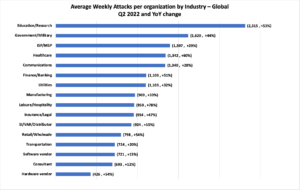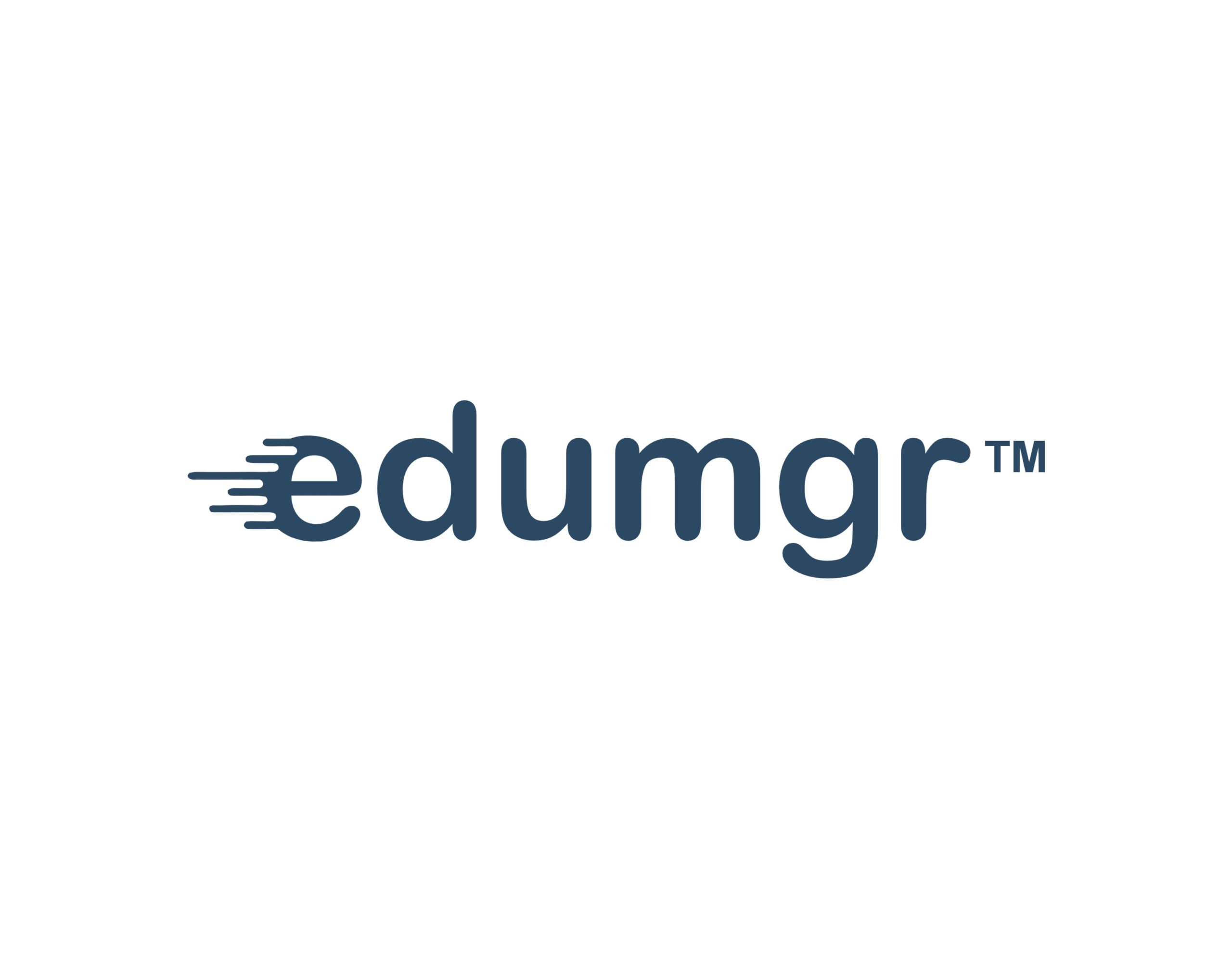Check Point Research (CPR) releases new data on cyber attack trends. Ransomware attacks now affect 1 out of 40 organizations a week. The top three most targeted industries for ransomware are government/military, education/research and healthcare. Higher geopolitical tensions, an increase in remote work and learning, and willingness of organizations to pay have led to a 59% YoY increase in ransomware attacks. CPR also shares general cyber attack trends, including overall cyber attacks by industry and region. The second quarter of 2022 saw an all-time peak, where global cyber-attacks increased by 32%, compared to Q2 2021, where the average weekly attacks per organization reached a peak of 1.2K attacks.
- Retailers and the wholesale sector saw the largest spike in ransomware attacks, with an alarming increase of 182%
- Government/military sector, reporting a staggering increase of 135%, reaching a ratio of 1 out of 24 organizations impacted by ransomware on a weekly basis
- Education/Research sector has become the most attacked industry worldwide, absorbing an average of more than 2.3K attacks per organization every week, which marks a 53% increase compared to Q2 2021
Check Point Research (CPR) is releasing new data on cyber attack trends. In a new report, CPR shares that the global weekly average of impacted organizations by ransomware now reaches 1 out of 40 – a 59% increase YoY (1 out of 64 organizations in Q2 2021).
Ransomware by Region
The regions that see the most cyber attacks are:
- Africa: the weekly average of impacted organizations is 1 out of 21 – a 21% increase YoY (1 out of 25 organizations in Q2 2021)
- Europe: the weekly average of impacted organizations is 1 out of 66 – a 1% decrease YoY (1 out of 65 organizations in Q2 2021)
- North America: the weekly average of impacted organizations is 1 out of 108 – a minor increase of 1% YoY (1 out of 109 organizations in Q2 2021)
- ANZ: the weekly average of impacted organizations is 1 out of 113 – an 18% increase YoY (1 out of 133 organizations in Q2 2021)
Latin America has seen the largest increase in attacks, spotting 1 out of 23 organizations impacted weekly, a 43% increase YoY, compared to 1 out of 33 in Q2 2021, followed by Asia region that has seen a 33% increase YoY, reaching 1 out of 17 organizations impacted weekly.
RELATED: Check Point Software’s 2022 Security Report: Global cyber pandemic’s magnitude revealed
Ransomware by Industry
Retailers and the wholesale sector saw the largest spike in ransomware attacks, with an alarming increase of 182%, compared to the same period last year, followed by the Distributors sector that saw a 143% increase and then, the government/military sector, reporting a staggering increase of 135%, reaching a ratio of 1 out of 24 organizations impacted by ransomware on weekly basis.
| Industry | Weekly Impacted Organizations | YoY Change |
| Government/Military | 1 out of 24 | +135% |
| Education/Research | 1 out of 30 | +83% |
| Healthcare | 1 out of 31 | +47% |
| ISP/MSP | 1 out of 37 | +9% |
| Finance/Banking | 1 out of 41 | +42% |
| Communications | 1 out of 46 | +59% |
| SI/VAR/Distributor | 1 out of 47 | +143% |
| Manufacturing | 1 out of 48 | +60% |
| Retail/Wholesale | 1 out of 53 | +182% |
| Utilities | 1 out of 59 | +11% |
| Transportation | 1 out of 70 | +28% |
| Software vendor | 1 out of 74 | -34% |
| Leisure/Hospitality | 1 out of 77 | +24% |
| Hardware vendor | 1 out of 78 | +48% |
| Insurance/Legal | 1 out of 81 | +1% |
| Consultant | 1 out of 87 | -17% |
Cyber Attacks by Industry
The Education/Research sector has become the most attacked industry worldwide, absorbing an average of more than 2.3K attacks per organization every week, which marks a 53% increase compared to Q2 2021.
The healthcare sector saw a 60% increase in cyber attacks compared to Q2 2021, reaching 1342 attacks per organization every week.

Cyber Attacks by Region
Africa was the most attacked region in Q2 2022, peaking at 1.76k weekly attacks on average, per organization, a nominal increase of 3%, compared to the same period last year against the continent. Following Africa, Asia and Latin America experienced astounding numbers of 1.68K and 1.60K on average accordingly, marking a 25% and a 29% increase respectively, year–over-year.
| Region | Weekly Attacks per Organization |
YoY Change |
| Africa | 1,758 | +3% |
| Asia | 1,684 | +25% |
| Latin Americas | 1,602 | +29% |
| Europe | 963 | +26% |
| ANZ | 937 | +82% |
| North America | 854 | +54% |
Quote: Omer Dembinsky, Data Group Manager at Check Point Software:
“Ransomware attacks are showing no signs of slowing down. Right now, we can say that 1 out of every 40 organizations we track is impacted by ransomware each week, which makes for a 59% YoY increase. Hackers are leveraging the increase in attack surface from remote work and learning, and the war between Ukraine and Russia also helps drive the proliferating trend, as geopolitical tensions rising inspires hackers to take sides. Lastly, the willingness of organizations to meet ransomware demands in order to protect patients has proved the business of ransomware to be highly lucrative. Hence, we see that hackers are continuing to invest resources in going after healthcare organizations. We strongly recommend organizations everywhere to take note of our ransomware prevention tips, such as backing up data, keeping systems up to date and training employees on awareness.”
Ransomware Prevention Tips
- Back Up Your Data. Make sure you back up your data regularly—constantly, if possible, and throughout the entire organization
- Be Proactive. It’s worth putting together a response strategy; in other words, what are you going to do if your organization is the target of a ransomware attack?
- Employ Content Scanning and Filtering. One common method for ransomware attackers is to trick employees into either providing their login credentials via a phishing link, or downloading a file that contains malware. You can protect against both of these potential threats by implementing more content scanning and filtering.
- Keep Your Systems Up to Date. Make sure to keep your systems up to date with the latest software patches.
- Train Your Employees. Ransomware attacks are often the result of poor employee training and/or bad employee habits. Make sure your employees are familiar with standard best practices in the cybersecurity world, like choosing strong passwords, never giving out their passwords to others, and avoiding links and content that appear suspicious or unfamiliar.


































